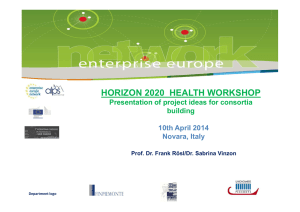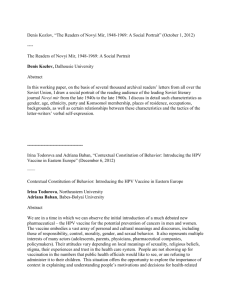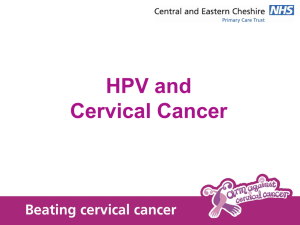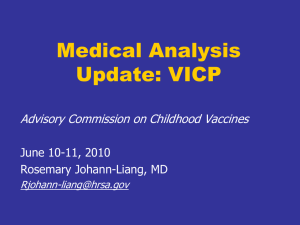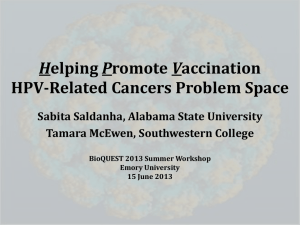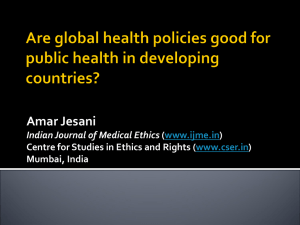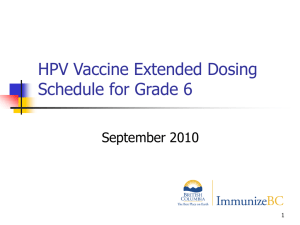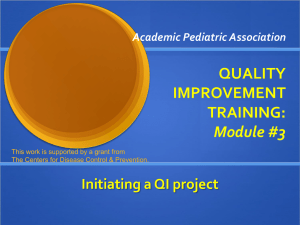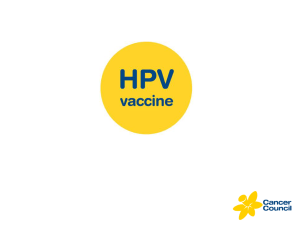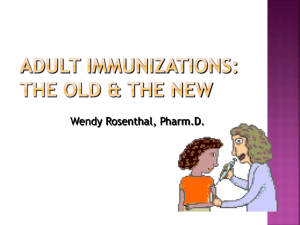Fernandez – Interventon Mapping HPV Study
advertisement
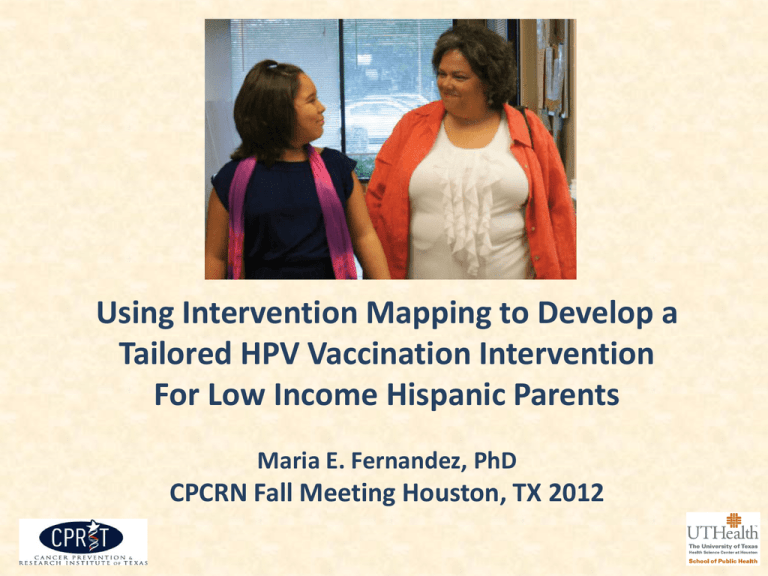
Using Intervention Mapping to Develop a Tailored HPV Vaccination Intervention For Low Income Hispanic Parents Maria E. Fernandez, PhD CPCRN Fall Meeting Houston, TX 2012 Research Team UTSPH Maria E. Fernández, PI Sally Vernon, Co-I David Lairson, Co-I Lara Savas, Co-I Angelica Roncancio, Co-I Barbara Kimmel, Project Coordinator Natalie Fernández-Espada, Project Coordinator Nancy De la Fuente, Data Collection Coordinator Chakema Carmack, Data Manager UT – Medical School Faculty Laura Benjamins, Co-I Francisco Orejuela, Co-I Sean Blackwell, Co-I Texas Children Hospital/ Prosalud Margaret Goetz, Co-I Background High rates of human papillomavirus (HPV) infection and low rates of screening among Hispanic women contribute to cervical cancerrelated health disparities in this population Low health literacy, language barriers and low income may influence Hispanics’ low uptake rate and failure to complete the HPV vaccine series Human Papillomavirus (HPV) HPV is the most common sexually transmitted infection1 HPV can be cleared by the body, but in some cases it leads to cervical cancer Hispanic women have higher cervical cancer incidence and mortality rates compared to non-Hispanic Whites2 1. CDC. (2011, August 17). Sexually Transmitted Diseases (STDs). Retrieved from http://www.cdc.gov/std/hpv/stdfact-hpv.htm 2. American Cancer Society. (2011). Cancer facts and figures 2011. Atlanta: American Cancer Society. Study Population and Timeframe Target population Hispanic parents of daughters (11-17 yrs) Daughters not vaccinated against HPV Spanish or English speaking Recruitment Site: Clinics & clinic waiting rooms Low-income areas Predominately Hispanic areas Part of Vaccine for Children’s program Timeframe Goal: Recruit 1,809 parents in 10 months 6 month follow up after baseline with clinic record validation Study Aims 1. Identify factors associated with parental decisions concerning HPV vaccination among low-income Hispanic parents 2. Use Intervention Mapping (IM) to develop two culturally appropriate interventions to promote HPV vaccine uptake print photonovella (fotonovela) self-directed, tailored interactive (TIV) iPad-based program 3. Evaluate the effectiveness and cost effectiveness of two lay health worker-delivered interventions Intervention Mapping Six Core Steps in IM: 1. 2. 3. 4. 5. 6. Assess needs Identify target behaviors, determinants, and change objectives Identify methods and strategies Develop program materials Plan for program adoption and implementation Evaluation Needs Assessment We identified factors/determinants of HPV vaccine uptake through conducting a literature review and qualitative research Literature review (45 studies) Determinants Identified in Literature Knowledge Attitude Perceived Benefits/Barriers Social Norms Perceived Susceptibility to HPV Resources Needs Assessment Qualitative Research with Hispanic parents (4 focus groups and 2 indepth interviews) Determinants and Change Objectives Based on identified determinants we developed matrices of change objectives that drove decisions about intervention content, methods, and strategies For Our Daughters - Para Nuestras Hijas The Intervention: Fotonovela Print fotonovelas are: brief stories with pictures & dialog popular in Spanish-speaking cultures often used to educate Latino audiences about health topics For Our Daughters fotonovela: is brief available in English and Spanish addresses key behavioral determinants For Our Daughters - Para Nuestras Hijas The Intervention: Tailored Interactive Program on iPad Moving video Stills with audio Graphics and Animation Data-based tailoring Self- Tailoring Software Development Flowchart for iPad-tailored For our Daughters Program Intervention: iPad-Tailored Interactive Program Tailored Portions Description of prgram content Rationale Language Parents choose either English or Spanish version Anticipating majority of parents will only speak Spanish but do not want to exclude English speakers Perceived Susceptibility Slideshow illustrating importance of HPV vaccine in preventing cervical cancer; demonstrates susceptibility Protection Motivation Theory Perceived Vaccine Efficacy Virtual promotora explains that the vaccine is effective (reinforced later in the program by the doctor) Protection Motivation Theory Block & Keller (1995)-increase belief in efficacy of the vaccine General Concerns/Barriers to Vaccination Provide set of common concerns addressed with additional information Increase belief in efficacy of the vaccine Address concerns (Social Cognitive Theory, Theory of Planned Behavior) Skill-Related Barriers to Vaccine Completion Present common skill-related barriers to completing vaccine series and ways to overcome them. Stress importance of completing vaccine series and provide information to do so Self- Efficacy Testimonials of mothers who have vaccinated their daughters Those low in self-efficacy hear from parents who encountered barriers to vaccination but were able to overcome them Tailoring: Perceived Susceptibility & Vaccine Efficacy Tailoring: General Concerns & Barriers Tailoring: Self-Efficacy Results of Usability Testing Hispanic parents indicated • Program was enjoyable and engaging • Confidence in ability to use the program • Information was appropriate and easy to understand Developed Training Programs Using Intervention Mapping Methods (Step 5) LHW 2 ½ Day Training Developed & Implemented Data Collectors (DC) 2 Day* Training Developed & Implemented 1) 2) 3) 4) 5) 6) 7) 1) 2) 3) 4) 5) 6) 7) Introduction, Study Objectives, Study Protocols, HPV & Cervical Cancer, HPV vaccine, Study Design and LHWs’ Roles, Overview of Intervention Materials, 8) Forms 9) iPad practice 10) Fotonovela practice 11) Q &A sessions 8) 9) 10) 11) 12) 13) Introduction Study Objectives Cervical Cancer & Statistics HPV HPV vaccine Study Design Overview of intervention materials Protocols Forms DCs’ roles & responsibilities’ DC Manual & Forms Gift Card protocol Survey * 4- half day training sessions Evaluation Design Group rendomized Intervention Trial 1)Baseline: Data collectors recruit, consent & conduct face-to-face computer-assisted interviews with parents in clinic waiting rooms 2) LHWs deliver intervention in Intervention clinic sites] 3) Follow-up: Data collectors conduct 6 month follow-up by telephone plus clinc record validation Future directions To determine the effectiveness of a stepped down intervention using the tailored multimedia intervention in clinics. Assess the effectiveness and cost effectiveness of a clinic only intervention (tailored multimedia program on iPads; no lay health workers) on vaccination initiation among age eligible boys and girls. Future Directions Assess the effectiveness and cost effectiveness of parental text message reminders on increasing HPV vaccination. Develop and test parental text messages designed to increase HPV vaccination completion among daughters who have initiated vaccination and to encourage initiation among daughters who have not. Future directions • The proposed study will explore linguistic agency assignment and level of detail • Agency assignments entail different attributions of responsibility that can affect health message persuasiveness. – Different versions of a pamphlet describing the H1N1 influenza virus that consistently framed viral transmission in terms of human agency (e.g., thousands of people may contract H1N1) or virus agency (H1N1 may infect thousands of people). – Assignment of agency to the virus significantly increased perceptions of threat severity, personal susceptibility, and vaccination intentions relative to human agency assignment. Summary Effectiveness and cost-effectiveness of the interventions will be evaluated in “real world setting” Findings will guide future work expanding the intervention to new population groups (e.g., boys, young adults, other ethnic groups) and testing new delivery models (e.g., stand along iPad without LHW facilitation creating a potential for widespread dissemination) Questions?

